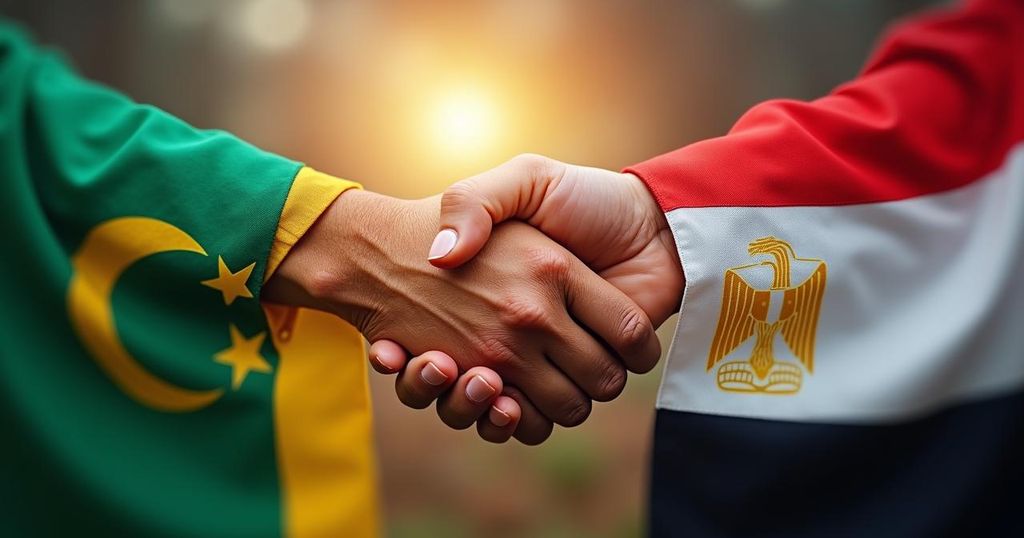Emergence of a Coalition Against Ethiopia: Insights from the Asmara Summit

Leaders from Egypt, Somalia, and Eritrea met in Asmara, forming a united front perceived as a threat to Ethiopia. The summit concluded with commitments to bolster Somali state institutions and confront terrorism, amidst rising tensions linked to historical disputes and Ethiopia’s quest for maritime access. Relations among the countries have soured over issues such as territorial claims and dam construction, prompting fears of escalating conflict.
Recent discussions among the leaders of Egypt, Somalia, and Eritrea in Asmara, Eritrea, have solidified an alliance perceived as a significant challenge to Ethiopia. A concluding statement from the summit emphasized the importance of “respect for the sovereignty… and territorial integrity of the countries in the region,” which may indirectly point to Ethiopia’s aspirations for maritime access. Tensions have escalated, particularly following a diplomatic dispute that has drawn Somalia closer to Egypt and Eritrea, both of which harbor longstanding grievances against Ethiopia. Hassan Khannenje, director of the Horn International Institute for Strategic Studies, characterized this emerging coalition as an “axis against [Ethiopian capital] Addis Ababa,” suggesting a coordinated effort to exert pressure on Ethiopia. A photo emerging from the meeting highlights the leaders, including President Isaias Afwerki of Eritrea, President Abdul Fattah al-Sisi of Egypt, and President Hassan Sheikh Mohamud of Somalia, who collectively resolved to strengthen Somali institutions to address domestic and external challenges, including combating terrorism. This meeting marks a significant moment in the context of Ethiopia-Somalia relations, which have been complicated since Ethiopia entered into a preliminary agreement with the self-declared state of Somaliland regarding its coastline. Meanwhile, tensions persist between Addis Ababa and Cairo over Ethiopia’s hydroelectric dam project on the Nile River, which Egypt claims threatens its water supply. The backdrop includes a complex history of fluctuating relations among these nations, particularly after a detente following the historic peace agreement between Ethiopia and Eritrea in 2018. However, following the conclusion of the civil conflict in Ethiopia’s Tigray region and Ethiopia’s renewed quest for access to Red Sea ports, relations have soured once again, prompting these countries to align more closely.
The geopolitical landscape of the Horn of Africa has been characterized by intricate relationships among Ethiopia, Egypt, Eritrea, and Somalia, often influenced by historical grievances and territorial disputes. Ethiopia, a landlocked nation, has persistently sought access to the sea, which remains a contentious issue given its implications for regional sovereignty. Over the past decade, Ethiopia’s ambitious infrastructure projects, like the Grand Ethiopian Renaissance Dam on the Nile, have heightened tensions, particularly with Egypt, which depends heavily on the river’s waters. Additionally, Somalia has experienced its own set of challenges as it grapples with internal conflicts and external pressures, leading to shifting alliances and a re-evaluation of its foreign relations. The recent summit in Asmara signifies a strategic pivot for Egypt, Somalia, and Eritrea as they consolidate their positions against Addis Ababa, reflecting the ongoing volatility in the region.
In summary, the recent summit in Asmara has marked a pivotal moment in the diplomatic relations within the Horn of Africa, as Egypt, Somalia, and Eritrea forge an alliance perceived as an opposition to Ethiopia. With historical grievances fueling this collaboration, the potential for escalating tensions remains significant, particularly in light of territorial disputes and Ethiopia’s aspirations for a sea outlet. The developments underscore the fragile stability in the region and the challenges posed by conflicted interests among the nations involved.
Original Source: www.bbc.com






